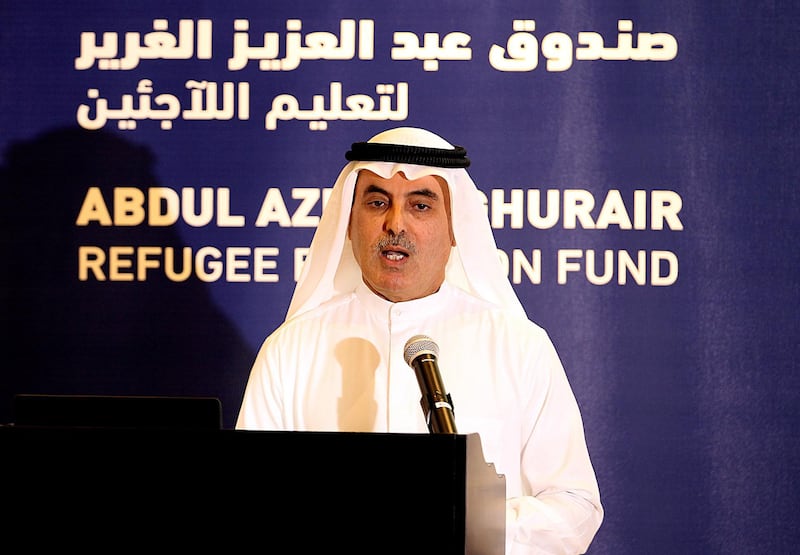Thousands of child refugees affected by conflicts and disasters will be helped back into education thanks to a Dh100 million project by Emirati philanthropist Abdul Aziz Al Ghurair.
The first phase of the Abdul Aziz Al Ghurair Refugee Education Fund - a three-year initiative to aid youngsters across the Middle East - has been launched in Dubai.
It will involve 6,500 refugee youth benefiting from Dh45 million of funding, in partnership with a number of charity organisations.
The first of three rounds of funding will support needy youngsters living in the UAE and in Jordan and Lebanon.
Announcing the funding plan at the Four Seasons Hotel in Dubai on Monday, Mr Ghurair said he is determined to invest in the future of refugee youths - and give them access to a better way of life.
“Millions of refugee children and young people continue to struggle to access education in this region and that is why I am committed to helping as many refugee youths as possible to get back into school,” he said.
According to figures from the United Nations High Commission for Refugees (UNHCR), there are four million refugee children who are currently out of school. Half of the world's refugee population is also based in the Arab world.
A mere 23 per cent of refugee children are enrolled in secondary school, compared to 84 per cent globally.
Mr Al Ghurair also called on the private sector to play a more active and visible role in helping young people across the region.
“There are a lot of good people in the UAE who are doing a lot of good work but they need to go out and let people know about it.
“I want people to be more involved. It is just as important for companies to give us their time as well as money.”
"I am affirming my commitment to help as many out-of-school youths, as I can, to get back into school,” he said.
Mr Ghurair said funds will be used to enable refugee children to attend secondary school, vocational training, and university, as well as acquiring skills to allow them to realise their aspirations for the future.
He said the UAE has become a global 'role model" for its charitable efforts.
“The UAE has become a role model for the world, setting new benchmarks in giving and philanthropy.
“It is a credit to our leaders that the UAE has been ranked as the number one country, across the world, when it comes to international humanitarian donations over the past five years.”
Last week, Mr Al Ghurair told The National that the traditional method of making private donations to charity was not enough.
He called on entrepreneurs to be open about their charitable donations and treat them like a publicly listed company.
_____________
Read more:
Refugee children to go back to school with a little help from the UAE
Emirati philanthropist calls for 'new era of giving'
Thousands of UAE students apply for university scholarships from Abu Ghurair Foundation
________________
Princess Haya Bint Al Hussein, the wife of Sheikh Mohammed bin Rashid, Vice President and Prime Minister of the UAE and Ruler of Dubai, has also pledged her support to the project.
“This generous philanthropic initiative to support the education of 6,500 Arab refugee children and youth in the first cycle will have a positive life-changing impact on so many of those displaced, who have had their lives disrupted by conflict,” she said.
The organisations that will benefit from the first round of funding are the Emirates Red Crescent, the United Nations Children’s Fund (Unicef), the Luminus Education of Jordan and Unite Lebanon Youth Project (ULYP).
In the UAE, the fund is working with the Emirates Red Crescent, along with the Ministry of Foreign Affairs and the UNHCR, to support the registration of children from grades one to 12.
In Jordan, the fund is teaming up with Unicef to provide access to education for vulnerable students from grades 9 to 12 who are living in refugee camps or host communities and are currently out of school or at risk of dropping out.
The fund is also working with the Unite Lebanon Youth Project to help young people, over the age of 14, to complete their secondary education while learning new skills and vocations –giving them access to higher education.







